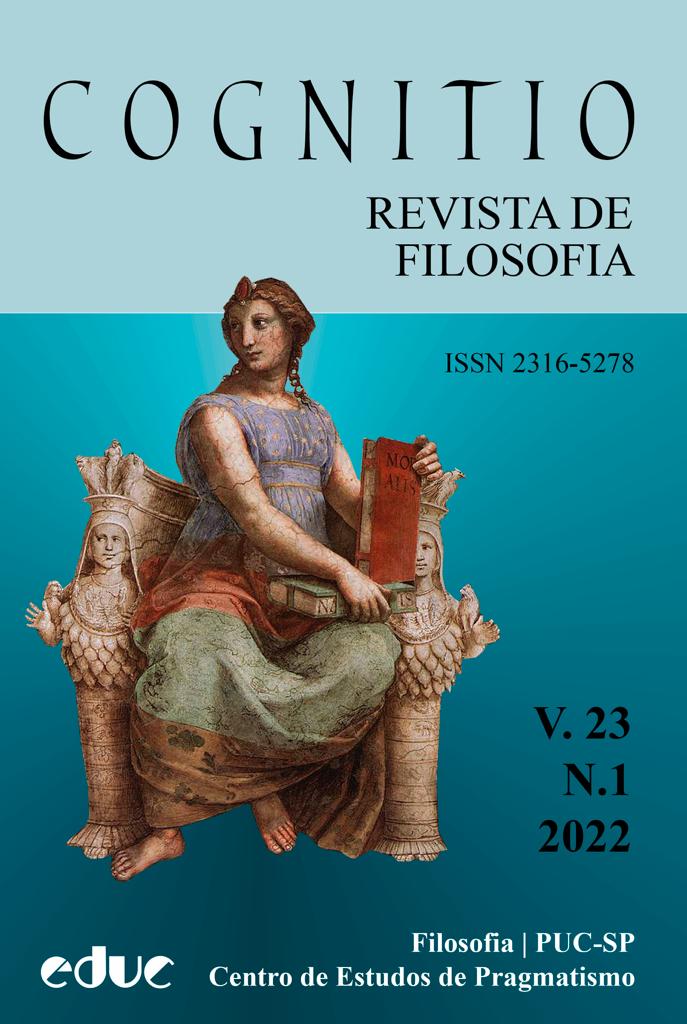Dewey and Simondon
the investigative act in biological and psychic individuations
DOI:
https://doi.org/10.23925/2316-5278.2022v23i1:e58938Abstract
Our goal, in this article, is to propose an articulation between Gilbert Simondon’s theory of individuation and John Dewey’s theory of investigation. In relation to the first, the “biological” and “psychic” aspects of individuation will be emphasized; as for the second, we will emphasize its main naturalist and epistemological elements, as well as Dewey’s more general concepts of “experience” and “nature”. We will argue that the individuation process is closely related to the ability, possessed by every living individual, to solve problems resulting from their constant interaction with the environment. We will propose, more precisely, a theoretical connection between the principle or concept of individuation and the idea that there is in the living organism an investigative aptitude that not only restores its “metastable” equilibrium, but also, and at the same time, always gives him a new individuality, both biological and psychic. We hope to obtain, as a result of this process of synthesis involving the ideas of Simondon and Dewey, an expanded understanding of the respective theories of individuation and inquiry.
References
ACCIOLY, M. A. Isto é simulação: a estratégia do efeito do real. Rio de Janeiro: E-papers, 2010. COMBES, M. Simondon: Individu et collectivité. Pour une philosophie du transindividuel. Paris:
PUF, 1999.
COSTA, R. DA. Gilbert Simondon e a operação de individuação. Interlab: labirintos do pensamen- to contemporâneo. São Paulo: Iluminuras, 2002.
DAMASCENO, V. Notas sobre a individuação intensiva em Simondon e Deleuze. O que nos faz pensar, v. 21, p. 173-186, 2007.
DELEUZE, G. Gilbert Simondon, O indivíduo e sua gênese físico-biológica. A ilha deserta. São Paulo: Iluminuras, 2008.
DEWEY, J. Body and Mind. Bulletin of the New York Academy of Medicine, v. IV, n.1, 1928.
DEWEY, J. Experience and Nature. New York: Dover Publications, 1958.
DEWEY, J. Logic: The Theory of Inquiry. New York: Holt, Rinehart and Winston, 1960.
DEWEY, J. Reconstruction in Philosophy. Mentor Book, The New American Library, 1950.
DEWEY, J. Textos Selecionados. Col. Os Pensadores, v. 40. São Paulo: Abril Cultural, 1974.
KALLEN, H.M. Individuality, Individualism, and John Dewey. The Antioch Review, v.19, n. 3, 1959. DOI: https://doi.org/10.2307/4610165
PIATT, D. A. Dewey’s Logical Theory. The Philosophy of John Dewey (Library of Living Philoso- phers), Chicago: Northwestern University, 1939.
POPP, Jerome A. Evolution’s first philosopher: John Dewey and the continuity of nature. New York: State University of New York, 2007.
SIMONDON, G. L’individu et sa genèse physico-biologique. Paris: PUF, 1964.
SIMONDON, G. L ́individuation à la lumière des notions de forme et d ́information. Grenoble:
Millon, 2005.
SIMONDON, G. La individuación a la luz de las nociones de forma y de información. Buenos Aires: Editorial Cactus, 2009.
VIRNO, P. Multidão e princípio de individuação. In. Lugar Comum: Estudos de Mídia, Cultura e Democracia. Rio de Janeiro: LATEC/UFRJ, 2004. p. 27-40.
Downloads
Published
How to Cite
Issue
Section
License
Copyright (c) 2022 http://creativecommons.org/licenses/by/4.0/

This work is licensed under a Creative Commons Attribution 4.0 International License.









